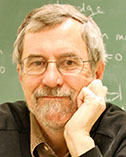
Kenneth Lange
University of California, Los Angeles
|
Primary Section: 32, Applied Mathematical Sciences Secondary Section: 26, Genetics Membership Type:
Member
(elected 2021)
|
Biosketch
Kenneth Lange is the Rosenfeld Professor of Computational Genetics in the Departments of Computational Medicine, Human Genetics, and Statistics at the University of California, Los Angeles. He served as chair of the UCLA Department of Computational Medicine for 9 years and as chair of the UCLA Department of Human Genetics for 12 years. During his academic career, he has mentored 22 doctoral students and 8 postdoctoral fellows and authored six advanced textbooks. Lange was born in Angola, Indiana, and raised in the neighboring town of Auburn, Indiana. As an undergraduate, he attended Case Institute of Technology and graduated from Michigan State University with a degree in mathematics in 1967. He graduated from MIT in 1971 with a PhD in mathematics. His dissertation advisor, Gian-Carlo Rota, was also a member of the National Academy of Sciences. Lange won the Snedecor award from the Joint Statistical Societies in 1993 and the Arno Motulsky-Barton Childs Award from the American Society of Human Genetics in 2020. He is a fellow of the American Statistical Association and the Institute of Math- ematical Statistics. At various times during his career he has held visiting or permanent academic appointments at the University of New Hampshire, Harvard, MIT, the University of Michigan, and the University of Helsinki. He was elected to the National Academy of Sciences in 2021.
Research Interests
Kenneth Lange’s research interests include genetic epidemiology, population genetics, membrane physiology, infectious disease modeling, demography, oncology, medical imaging, stochastic processes, optimization theory, and computational statistics. Many of his landmark papers predate by a decade or more the current flood of biological applications of hidden Markov models, Markov chain Monte Carlo (MCMC), and high-dimensional optimization. His scientific achievements include: a) earliest algorithm for calculating Mendelian likelihoods over inbred pedigrees, b) earliest application of linear mixed models to human pedigree data, c) introduction of EM (expectation- maximization) and MM (majorization-minimization) algorithms to medical imaging, d) early application of MCMC sampling in human genetics, e) construction of accurate statistical models for gene mapping by radiation hybrids, f) introduction of lasso penalized regression to genome-wide association studies (GWAS), g) introduction of hidden Markov models for single channel recording experiments in physiology, h) introduction of graphical processing units (GPUs) to high-performance statistical computing, and i) popularization and generalization of the MM principle in computational statistics. Lange and his UCLA colleagues wrote the software programs SimWalk, Mendel, and Admixture, widely used and freely distributed to the scientific community. In 2019, Lange and colleagues launched the OpenMendel project for cooperative software development in genomics.

